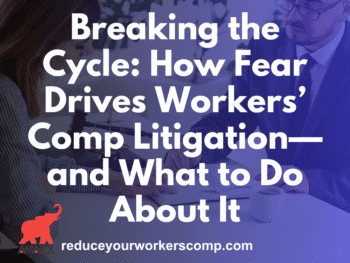As often stated our articles are usually about workers’ compensation cost containment for employers. So, why do we talk about laws seeming to favor or be directed towards employees?
It’s simple. In accounting there are direct expenses: costs of doing business known about and planned for. Then there are indirect expenses: these costs are somewhat unknown, or if know, the exact amounts are not fixed.
Think of fines, fees, penalties and the time and aggravation of law suits when employers do not obey labor laws and allow acts of discrimination, hostile work environments, unsafe workplace activities, etc. as the “indirect expense” of your workers’ compensation program – not planned but costing BIG BUCKS. And, as mentioned many times – your company is now on the work comp enforcement team’s radar and they are looking at you.
A new law, effective last week in New York, expands protections for workers who exercise their rights under state labor law by increasing the minimum civil penalty against employers who retaliate against employees from $200 to $2,000 and the maximum penalty from $1,000 to $10,000.
In addition, the law allows the Commissioner of Labor to award lost compensation to workers who have been victims of employer retaliation. by Governor David Paterson signed the law on August 26, 2009.
While New York’s labor law has long prohibited employers from retaliating against employees who report violations to the Labor Department, the new law greatly strengthens that protection. Retaliation occurs when employers take adverse action against employees for filing claims or providing information to the Labor Department about violations. Retaliatory acts can include discharge of the employee, demotion, cutting pay, or reassignment to a less desirable work shift or work duties.
Gov. Paterson noted, “Every worker in New York is afforded basic protections under state labor law – minimum wage, meal breaks and the right to be paid in a timely manner. Oftentimes, when workers are not afforded those rights, many are too apprehensive to come forward due to fear of retaliation by their employers. This law will persuade more workers to come forward, while at the same time ensuring that lawbreaking employers who do retaliate against workers will face stiff penalties.”
This new law is designed to not only protect workers, but also law-abiding employers who are put at a competitive disadvantage by scofflaw employers who grossly underpay their workers or commit other violations of the labor law.
In January 2009, Gov. Paterson announced that through enhanced enforcement of existing labor laws, the Department of Labor collected and disbursed $24.6 million for more than 17,000 workers across the State. These recovered wages represented the largest amount of collected and distributed monies in the Labor Department’s 100 years of existence.
However, increased enforcement also can lead to increased worker retaliation. Since 2007 there have been a number of instances of retaliation. For example, three restaurant workers on Long Island were fired for complaining to the Labor Department about subminimum wages; a backstretch worker from the Saratoga race course was denied a job he had been promised because of his role in the Labor Department investigation of the industry; and a supermarket bagger was discharged after reporting that he got only tips, no wages at all.
If this law had been in effect at the time of these violations, the Department could have imposed as much as $10,000 in civil penalties per violation, rather than the maximum amount of $2,000 available under previous law. (workersxzcompxzkit)
State Senator George Onorato, the chairman of the Senate Standing Committee on Labor added, “All too often, workers who turn to the State Department of Labor to help them recover unpaid wages or receive help with other labor law violations end up getting fired, or are otherwise victims of workplace retaliation – including reduced hours, losses of benefits, and different work assignments – by their employers. Employers who willfully underpay their workers or otherwise violate labor rights and protections must be held accountable for their actions, and worker ‘whistleblowers’ who attempt to stand up for their rights must be able to come forward and seek help without fear of losing their jobs.”
Author Robert Elliott J.D./ Consultant.
He can be contacted at: Robert_Elliott@ReduceYourWorkersComp.com
TO DOWNLOAD OR LISTEN TO FREE AUDIO PODCAST click here: http://www.workerscompkit.com/gallagher/mp3
By: Anthony Van Gorp, private investigator with 25 years experience.
WC Books: http://www.reduceyourworkerscomp.com/workers-comp-books-manuals.php
TD Calculator: www.ReduceYourWorkersComp.com/transitional-duty-cost-calculator.php
Do not use this information without independent verification. All state laws vary. You should consult with your insurance broker about workers’ comp issues.
©2009 Amaxx Risk Solutions, Inc. All rights reserved under International Copyright Law. If you would like permission to reprint this material, contact Info@WorkersCompKit.com



























